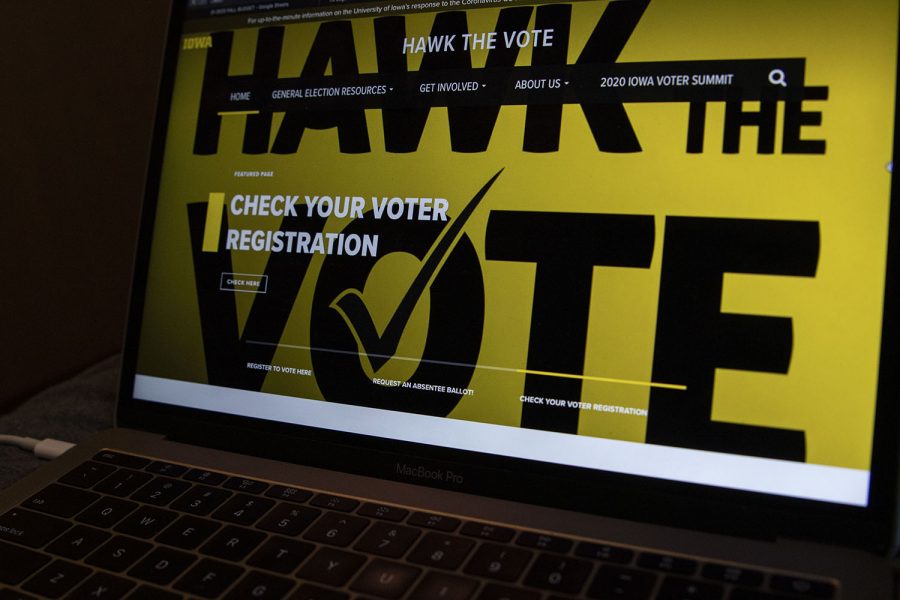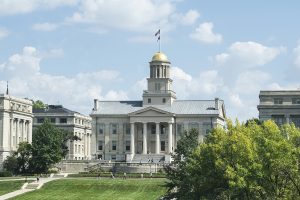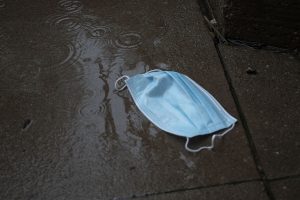Student organizations, Johnson County looks to keep young voters civically engaged during COVID-19
Due to social distancing guidelines and concerns of safety during COVID-19, college students and other young voters have to look for new, innovative ways to stay civically engaged.
The Hawk the Vote website is seen on Monday, Sept. 14, 2020.
September 14, 2020
As the election approaches during the pandemic, first-time and young voters are looking for new ways to stay active civically while remaining safe.
At the University of Iowa, the non-partisan student organization Hawk the Vote is working to continue their pledge to register students to vote, educate them on voting, and foster a civically-engaged community on campus.
Executive Director Jocelyn Roof said while this year changed the organization’s plans, it has started new outreach programs to keep students active in politics.
The organization’s two main projects are the 90 Percent Challenge — which looks towards student organizations and groups to have 90 percent of their eligible members registered to vote — and their new student Voting Ambassador program to get “some local voting experts on campus,” as Roof put it.
“We have between 25 and 30 student organizations signed up for the 90 Percent Challenge right now,” she said. “We currently have 130 ambassadors who will spend one to two hours a week posting on social media and contacting up to 100 of their friends from their own networks about updating registrations, requesting absentee ballots, and answering any questions they might have about voting”
Roof said Hawk the Vote wanted to expand their digital side and get creative this fall in light of COVID-19. She said these two programs were a combination of what other organizations and schools in the past have done to keep students engaged. For example, the 90 Percent Challenge was piloted at the University of Michigan.
Hawk the Vote typically registers around 2,000 students to vote during welcome week alone in the past couple of years, which Roof said couldn’t happen this year. However, the director said she expects Hawk the Vote’s Voting Ambassador program will reach more students and community members.
“I’m optimistic about this year and we’ll have better data in real time to see how things are progressing because each of our ambassadors are updating a spreadsheet with confidential information,” she said. “Once we really get going, we… might be able to have one-on-one conversations with around 13,000 people, which is way more people than we’ve been able to reach in the past.”
Alongside concerns about the pandemic, Peter De Guzman, a research and program coordinator for the Center for Information and Research on Civic Learning and Engagement (CIRCLES) at Tufts University, said young voters from 18 to 29 have become more civically engaged due to protests and the Black Lives Matter movement.
He said CIRCLES polling has shown that young people are remaining engaged in several ways, including with an uptick in donating money to campaigns and convincing others to vote.
“We compared our 2018 and 2020 election polls specifically around 18-24 year olds [and] we are seeing in our most recent poll of about 2,200 people that 50 percent of young people have tried to convince other people to vote,” De Guzman said. “And that’s higher than the 33 percent in 2018. We are also seeing 27 percent of young people said they attended a demonstration or march compared to 16 percent in 2018 following the Marjory Stoneman Douglas High School shooting.”
The program coordinate said another issue for young people in the 2020 election is accessibility to voting. Since a lot of first-time voters don’t necessarily know how to request an absentee ballot or the guidelines for voting by mail, he said, it might be more difficult for younger voters to participate and remain safe, he said.
This issue has been central to Johnson County Auditor Travis Weipert and his preparations for the election. He said while the auditor’s office has hired extra staff and moved locations to accommodate and increase in mail-in voting, they are also still preparing to have satellite locations for voters to vote early.
“We’re hoping satellite locations will help voters social distance, since voters can go there instead of to their precincts on election day,” Weipert said. “We are not having one at the university’s hospitals this year, but we will have some on campus for younger voters.”






